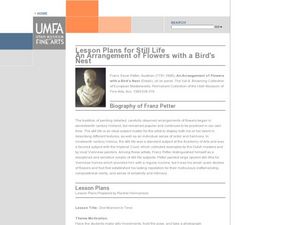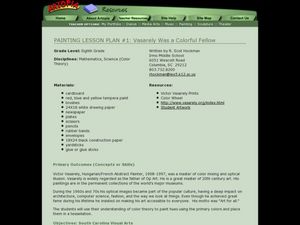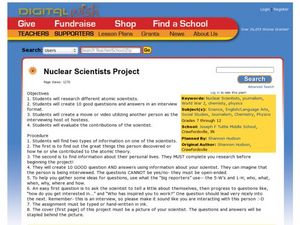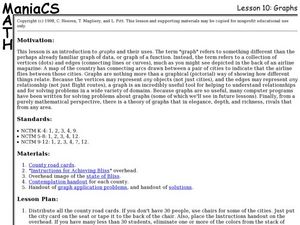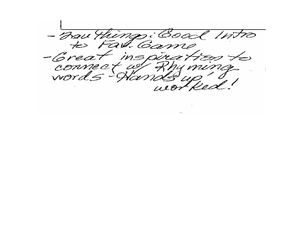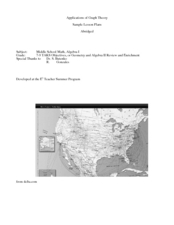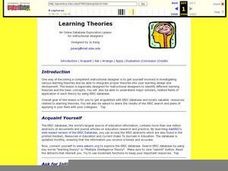Curated OER
Mate Selection Theory
Students study the mate selection theories. They compose their own personal list of characteristics, qualities, and values desired in a marriage partner. They identify and explain the Mate Selection Theory and analyze the importance...
Curated OER
One Moment in Time
Students discuss the Mimetic theory and design a still life design in linoleum block. In this Mimetic theory lesson, students discuss the importance of realism in art and research Greek and Roman art forms from which the Mimetic...
Curated OER
Conspiracy Theory: Lincoln's Assassination
Students determine how the Lincoln assassination impacted the United States. In this conspiracy theory lesson, students examine selected primary sources and chart the information they gather from the sources.
Curated OER
Pitch, Intonation, Harmonic Theory
Pupils listen to pitches and determine if they are in tune, flat or sharp. Using Aurelia computer software and playing as a band, students practice pitch theory, and play two-octave major scales. They practice and discuss how to tune...
Curated OER
Relative Masses
Students investigate relative mass using 8 different items. In this relative masses lesson plan, students discuss as a class John Dalton's atomic theory. They take the masses of the 8 items and record their data. They discuss relative...
Curated OER
Vasarely Was A Colorful Fellow
Eighth graders create artwork inspired by the work of Victor Vasarely. In this op art lesson, 8th graders explore color theory and color mixing. Students create ten shapes to use in their artwork and over the course of two weeks,...
Curated OER
Modeling the Big Bang and the Formation of the Universe
Sixth graders conduct an experiment to understand the Big Bang Theory. In this Big Bang Theory lesson, 6th graders will observe a balloon with confetti popping to emulate and analyze information related tot he Big Bang theory....
Curated OER
You Have All the Answers
Students explore the concept of theories in science while examining the theory of evolution. They conduct research and participate in a discussion about current issues in science culminating in the creation of question and answer pamphlets.
Curated OER
Nuclear Scientists Project
Students explore nuclear scientists. In this nuclear science research lesson, students choose a scientist who has contributed to nuclear theory, research his/her life and accomplishments, and write a paper. Students generate...
Curated OER
Lesson 10: Graphs
Students explore graph theory. In this geometry lesson, graphs are used to solve problems in a variety of domains. In this lesson the term graph refers to a collection of vertices and edges used to depict...
Curated OER
Classroom Builder
Learners explore music theory by discussing a classic song. In this musical notation activity, students listen to the song "My Favorite Things" and discuss and share their personal tastes with the class. Learners practice writing notes...
Curated OER
Gaia: The Wisdom of the Earth
Learners are introduced to Gaia theory of natural homeostasis. They graph Earth's temperatures over time, construct terrariums or monitor the outdoor environment. Related videos titles are suggested, but may be outdated. The objectives...
Curated OER
How do we know that the theory of evolution is correct?
Students read passages and view a slide show on the theory of evolution and provide evidence that this theory is correct. In this evolution lesson plan, students read about fossils, anatomy, organs, fetal development, and more.
Curated OER
The Big Bang Theory
Students explore the Big Bang Theory and discover how it can be used to explain the origin of the universe. For this Big Bang Theory lesson, students use a balloon with colored paper inside, blow it up and pop it, group the colored...
Curated OER
Investigating Our Past: Where Did Humans Come From?
Investigate the theories of human evolution. In this research based lesson, learners research and discuss how geographic isolation, interbreeding, generalization, and specialization are factors in the history of humans. Groups work...
Curated OER
Proving (a Theorem) and Disproving (a Theory)
As a cross-curricular instructional activity, your class examines the issues of gender discrimination, careers, and gender roles. They read and discuss an article, prepare a proof of the Pythagorean theorem as a class, and develop a...
Institute of Electrical and Electronics Engineers
Coloring Discrete Structures
What's the least number of colors needed to color a U.S. map? The lesson begins by having pupils view a video clip on continuous and discrete phenomenon, then launches into an activity reminiscent of Zeno's paradox. A separate video...
American Statistical Association
Chunk it!
Chunking information helps you remember that information longer. A hands-on activity tests this theory by having learners collect and analyze their own data. Following their conclusions, they conduct randomization simulations to...
California Department of Education
Consonance and Dissonance: Creating Intervals for Emotions (CTE)
How are music and emotion related? Using lesson plan two of four from the Changing One's Tune: A Music Therapy STEM Integrated Project Series, scholars explore the connection between the two topics. They learn to recognize different...
Curated OER
A Model for Natural Selection- Spaghetti Worms
Does the early bird really get the worm? If so, which color of worm does it prefer? In an exciting and easy week-long field investigation, young field biologists set up a one square meter feeding area for birds. If you have a webcam,...
Virginia Department of Education
Moles Lab Activities
Want my name and number? It's 6.0221415 times 10 to the 23rd, and my name is Avogadro. Providing nine different activities, experiments, and labs, this lesson keeps Avogadro relevant to your class all year long.
Curated OER
Application of Graph Theory
Students investigate different online tutorials as they study graphing. In this graphing instructional activity, students apply the concept of graphs cross curricular and use it to make predictions. They define the purpose and theories...
Curated OER
Learning Theories
Students access the ERIC database and search for the resources on learning theories. They use the features of ERIC to bookmark sources and then use Excel to create a summary of the database search.
Curated OER
Got These Properties? (Commutative in Addition/Zero in Addition and Subtraction)
Second graders examine the commutative property of addition and the property of zero in addition and subtraction. They complete an asessment worksheet to gain practice reading and working number sentences horizontally and vertically.
Other popular searches
- Math Number Theory
- Number Theory and Operations
- Number Theory 1
- Number Theory Rounding
- Number Theory Ed Helper
- Number Theory Ii
- Number Theory Edhelper
- Number Theory Concepts
- Number Theory Lesson Plans
- Math + Number Theory
- Egypt Math Number Theory
- Color Tiles Number Theory



